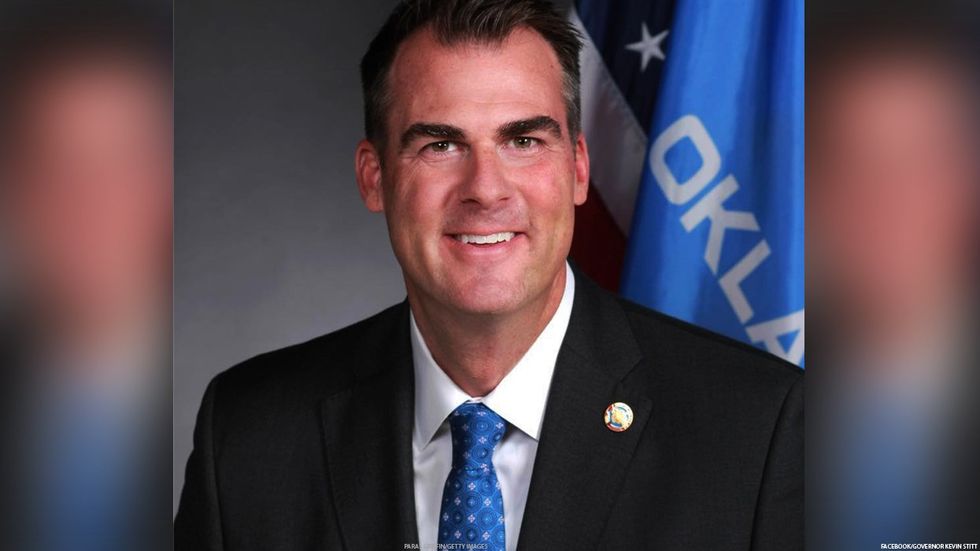Oklahoma has joined the long list of conservative states banning gender-affirming care for transgender minors.
Gov. Kevin Stitt, a Republican, signed the ban into law Monday. Senate Bill 613 bars health care professionals from providing hormones, puberty blockers, and surgeries to people under 18 for the purpose of gender transition. It takes effect immediately, although young people already receiving hormones or puberty blockers have six months in which to cease treatment.
Penalties for violation include felony charges, revocation of license, and civil lawsuits, which can be brought by a parent or guardian.
“Last year, I called for a statewide ban on all irreversible gender transition surgeries and hormone therapies on minors, so I am thrilled to sign this into law today and protect our kids,” said a statement issued by Stitt. “We cannot turn a blind eye to what’s happening across our nation, and as governor I am proud to stand up for what’s right and ban life-altering transition surgeries on children in the state of Oklahoma.”
Actually, genital surgeries are almost never performed on minors, and the effects of puberty blockers and hormones are either fully or largely reversible. Gender-affirming care for youth is supported by every major medical association in the U.S.
Last year, Stitt signed legislation withholding federal funds made available under the American Rescue Plan Act from the University of Oklahoma Medical Center and its Children’s Hospital unless they cease providing gender-affirming medications or surgeries to people under 18. The medical providers agreed to the terms.
Before Stitt signed SB 613, civil rights groups promised legal action. “In a perilous game of chicken with their governor, Oklahoma lawmakers pushed through SB 613, a dangerous bill that will jeopardize the health and lives of transgender youth, notwithstanding the overwhelming body of scientific and medical evidence supporting this care as safe, effective, appropriate and necessary,” said a joint statement from Lambda Legal, the American Civil Liberties Union, and the ACLU of Oklahoma. “Transgender youth in Oklahoma deserve the support and care necessary to give them the same chance to thrive as their peers. Gender-affirming care is a critical part of helping transgender adolescents succeed, establish healthy relationships with their friends and family, live authentically as themselves, and dream about their futures. If this bill is signed into law, we will defend the rights of transgender youth in court, just as we have done in other states engaging in this anti-science and discriminatory fearmongering.”
The Human Rights Campaign also condemned the legislation, noting that Stitt had claimed he would veto any legislation until the Oklahoma Senate passes bills on tax cuts and education funding but made an exception for SB 613.
“Governor Stitt is so dedicated to his anti-LGBTQ+ agenda that he went back on his own word in order to prevent transgender youth from accessing medically necessary healthcare,” said a statement from HRC Legal Director Sarah Warbelow. “SB 613 not only attacks transgender youth, it attacks anyone that supports them. It’s discriminatory, stigmatizing, and dangerous. The Governor and his extremist lawmakers know that every credible medical organization supports gender-affirming care, because it is best practice care that is delivered in an age appropriate manner in consultation with parents, doctors, and medical experts. Yet they don’t care, because it’s not politically expedient for them. HRC will continue to fight for transgender kids in Oklahoma, even when their government won’t.”
Other states that have outlawed most or all gender-affirming care for trans minors through legislation are Alabama, Arizona, Arkansas, Georgia, Idaho, Indiana, Iowa, Kentucky, Mississippi, Montana, North Dakota, South Dakota, Tennessee, Utah, and West Virginia. Florida has put a ban in place through its medical boards and is considering a bill for an even stricter measure. Missouri's attorney general has put out severe restrictions on this care, but they are now temporarily blocked by court action, as are the Alabama and Arkansas bans. Bans are pending in several other states.



















































































